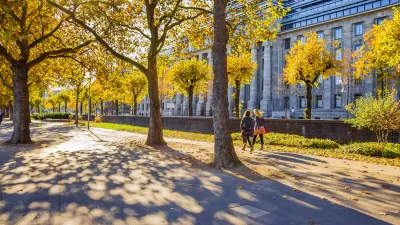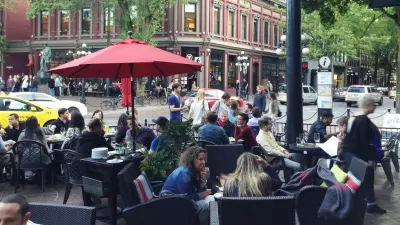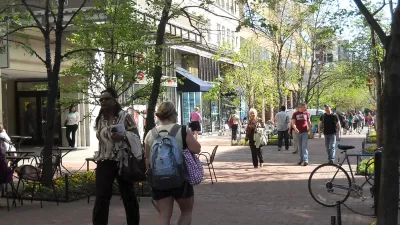New research sheds light on how the brain responds to urban environments and architecture.

The built environment, writes Jared Green for the American Society of Landscape Architects, "is directly linked with happiness and well-being, and too often urban environments fail to put people at ease." Justin Hollander, professor of urban and environmental planning and policy at Tufts University, says "we are deeply influenced by our surroundings" thanks to our "automatic (non-conscious) response to shapes, patterns, and colors."
"As we now understand, humans are drawn to landscapes that provide a refuge, a sense of safety, and prospect, a view of the entire scene, which supports that sense of safety. Storytelling is also important in landscapes, whether they are gardens, parks, or streetscapes. Humans are drawn to landscapes that provide clear sequences." In his experiments, Hollander uses eye-tracking technology to quantify the effects of various environments on the human brain. "Hollander said eye tracking software shows that New Urbanist-style communities, which have homes closer to the street; traditional architecture that mimic faces; and sidewalks all “encourage walking.” If a pedestrian can see a sequence — one, two, three, four homes in a row — they are more likely to want to walk down that row."
"According to Nikos Salingaros, professor of mathematics, architecture, urban, and complexity theory at the University of Texas at San Antonio, architects today are wed to a style rooted in 1920s Germany — the Bauhaus — that creates an unhealthy built environment" composed of "stylistically irrelevant glass boxes" that create cognitive stress in the human brain. Salingaros suggests that healthy environments are those that privilege human connectivity and the human scale–"intimate networks that are comfortable to humans." Architect and author Ann Sussman also suggests solutions for mitigating the effects of existing forms. In Somerville, Massachusetts, "the negative impact of the blank concrete wall of a parking garage was mitigated through public art and greenery."
Because "environments that are easier to fixate on cause less cognitive stress" and have a powerful impact on public health, argues Hollander, "planners, landscape architects, and architects have a responsibility to design a built environment that increases well-being."
FULL STORY: New Research: The Built Environment Impacts Our Health and Happiness More Than We Know

Planetizen Federal Action Tracker
A weekly monitor of how Trump’s orders and actions are impacting planners and planning in America.

Congressman Proposes Bill to Rename DC Metro “Trump Train”
The Make Autorail Great Again Act would withhold federal funding to the system until the Washington Metropolitan Area Transit Authority (WMATA), rebrands as the Washington Metropolitan Authority for Greater Access (WMAGA).

The Simple Legislative Tool Transforming Vacant Downtowns
In California, Michigan and Georgia, an easy win is bringing dollars — and delight — back to city centers.

The States Losing Rural Delivery Rooms at an Alarming Pace
In some states, as few as 9% of rural hospitals still deliver babies. As a result, rising pre-term births, no adequate pre-term care and harrowing close calls are a growing reality.

The Small South Asian Republic Going all in on EVs
Thanks to one simple policy change less than five years ago, 65% of new cars in this Himalayan country are now electric.

DC Backpedals on Bike Lane Protection, Swaps Barriers for Paint
Citing aesthetic concerns, the city is removing the concrete barriers and flexposts that once separated Arizona Avenue cyclists from motor vehicles.
Urban Design for Planners 1: Software Tools
This six-course series explores essential urban design concepts using open source software and equips planners with the tools they need to participate fully in the urban design process.
Planning for Universal Design
Learn the tools for implementing Universal Design in planning regulations.
Smith Gee Studio
City of Charlotte
City of Camden Redevelopment Agency
City of Astoria
Transportation Research & Education Center (TREC) at Portland State University
US High Speed Rail Association
City of Camden Redevelopment Agency
Municipality of Princeton (NJ)





























